Recap: The Leaders Debate
[dropcap]T[/dropcap]his past week, viewers were subject to the most exciting event of the TV calendar – the pre-election debate on ITV between seven political leaders all vying for votes ahead of the forthcoming general election. It was full of excitement, every second of the two hours being edge-of-your-seat stuff; hold onto your hats as I lead you through a televisual spectacular that couldn’t have been more gripping if it tried.
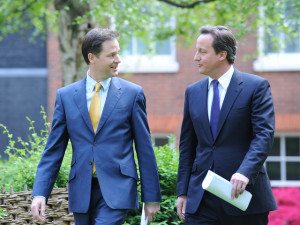
Photo: Nick Clegg and David Cameron – Flickr/Number 10
But first, we meet the seven contenders. From left to right, we had Natalie Bennett (Green), Nick Clegg (Liberal Democrats), Nigel Farage (UKIP), Ed Miliband (Labour), Leanne Wood (Plaid Cymru), Nicola Sturgeon (SNP), and David Cameron (Conservative). Julie Etchingham (Lindsay Duncan) did her best to moderate, but her role amounted to little more than standing in front of the squabblers, shouting names until someone listened to her, sort of like a supply teacher who can’t control a class.
So, what of the actual debates? The format was fairly simple – each leader got a minute for an opening statement, and then four questions were asked. Each leader was able to answer uninterrupted for a minute, and then they all debated for about twenty minutes.
The show ended with a closing statement from each candidate, and they then wandered off, shaking hands with each other and the audience.
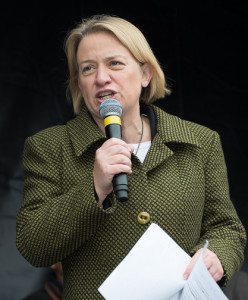
Photo: Natalie Bennett – Flickr/The Weekly Bull
Natalie Bennett (an Australian Admiral Ackbar stunt double) got to go first, and we were off.
I did like the opening statement section – each leader got to spell out their good attributes and make a plea for votes, but the camera work made it look like the selection screen on a particularly crap beat-‘em-up where you don’t even want your avatar to win (that said, I would like to see some of these guys in a Mortal Kombat game when the fatalities are being dusted off).
The four questions were on the topics of the economy, the NHS, immigration and education.
The leaders’ debating wasn’t really very interesting, as we pretty much saw a group of well-oiled people reading off scripts, reciting the same old party lines and soundbites, meaning this debate could’ve been assembled by news snippets and looked much the same – it essentially morphed into an episode of The Weakest Link, only none of the contestants could answer any questions and there didn’t seem to be money in the bank.
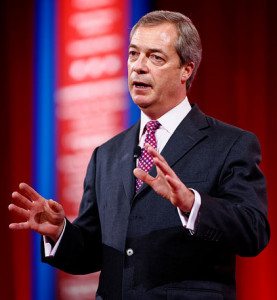
Photo: Nigel Farage – Flickr/Michael Vadon
However, there were some moments of excitement.
Nigel Farage (resembling the hotel manager played by Tim Curry in Home Alone 2) caused a bit of an outrage when, in the course of discussing saving money for the NHS, he used a statistic about the number of foreign people diagnosed with HIV on the NHS. The other leaders – especially Leanne Wood, who took a break from resembling a failing wedding planner for the event – then rounded on Farage, accusing him of being a scaremonger who blames immigrants for everything.
Also, when talking about the armed forces, David Cameron (eerily resembling a brow-beaten Iggle Piggle squeezed into a sausage casing) was interrupted by a heckler complaining about the number of veterans on the street. She was quickly removed from the audience and taken outside to be (I can only assume) flogged and executed.
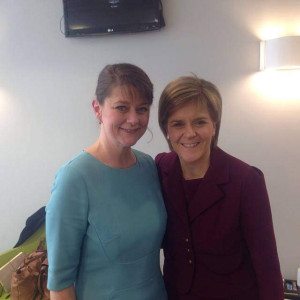
Photo: Leanne Wood and Nicola Sturgeon – Flickr/Plaid Cymru
Opinion polls made every leader both a winner and a loser of the debate, and every party’s spin-doctors were working busily away.
It was a good night for Wood and Sturgeon (Jimmy Krankee, or an unsuccessful Hilary Clinton impersonator), as this was notably their first real piece of exposure to the wider UK. There were also, at times, echoes of the previous election debates – Nick Clegg, looking more than ever like the middle manager of a depressing carpet salesroom, referred to people by name, for instance.
As was feared, the debate suffered from a number of problems.
A clause was written in the debate contract that the moderator did not need to apportion time equally, but rather allocate time as they saw fit to cover attacks made and reprisals – that sort of thing.
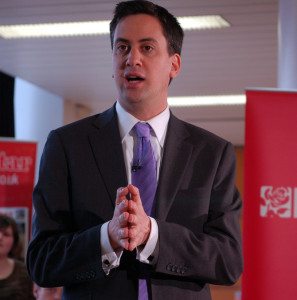
Photo: Ed Miliband – Flickr/Joanna Kiyoné
What this meant in practice was the three main parties tended to bicker amongst themselves, with Miliband (a miserable Picasso painting of a man with a general air of gormlessness) seizing his only real chance to debate with Cameron as much as he could. The smaller parties all benefitted from the debates, but were somewhat neglected by the focus on the other three.
There was also criticism of the lack of inclusion of the DUP, who are currently the fourth largest party in Westminster, which displeased Peter Robinson no end, although the broadcasters made it clear that the stage was packed enough as it was. And, taking no sides on that discussion, the stage was definitely too packed.
Having such a large main cast meant that no-one got the time to say everything they wanted, reducing what really should be considerable discussions on serious topics into soundbites and slogans.
It’s essentially the problem that they had with the later series of Friends – thank goodness the leaders didn’t start making word counts as Lisa Kudrow and the gang did
So what can we say overall? It was incredibly boring and tedious to watch (although around seven million people stuck about until the end, so clearly I’m missing something here), but based on what the leaders wanted to take away from the night, it was clearly a success for them all.
Some will be displeased that we could not have a follow-up to the three-way debates of 2010, but this debate suited the way this election is shaping up – a confusing mess with a daft number of figures, and no-one really following what was going on.
![]() Who do you think won the leaders debate? Let us know in the comments below or Tweet us @BoarTelevision.
Who do you think won the leaders debate? Let us know in the comments below or Tweet us @BoarTelevision.
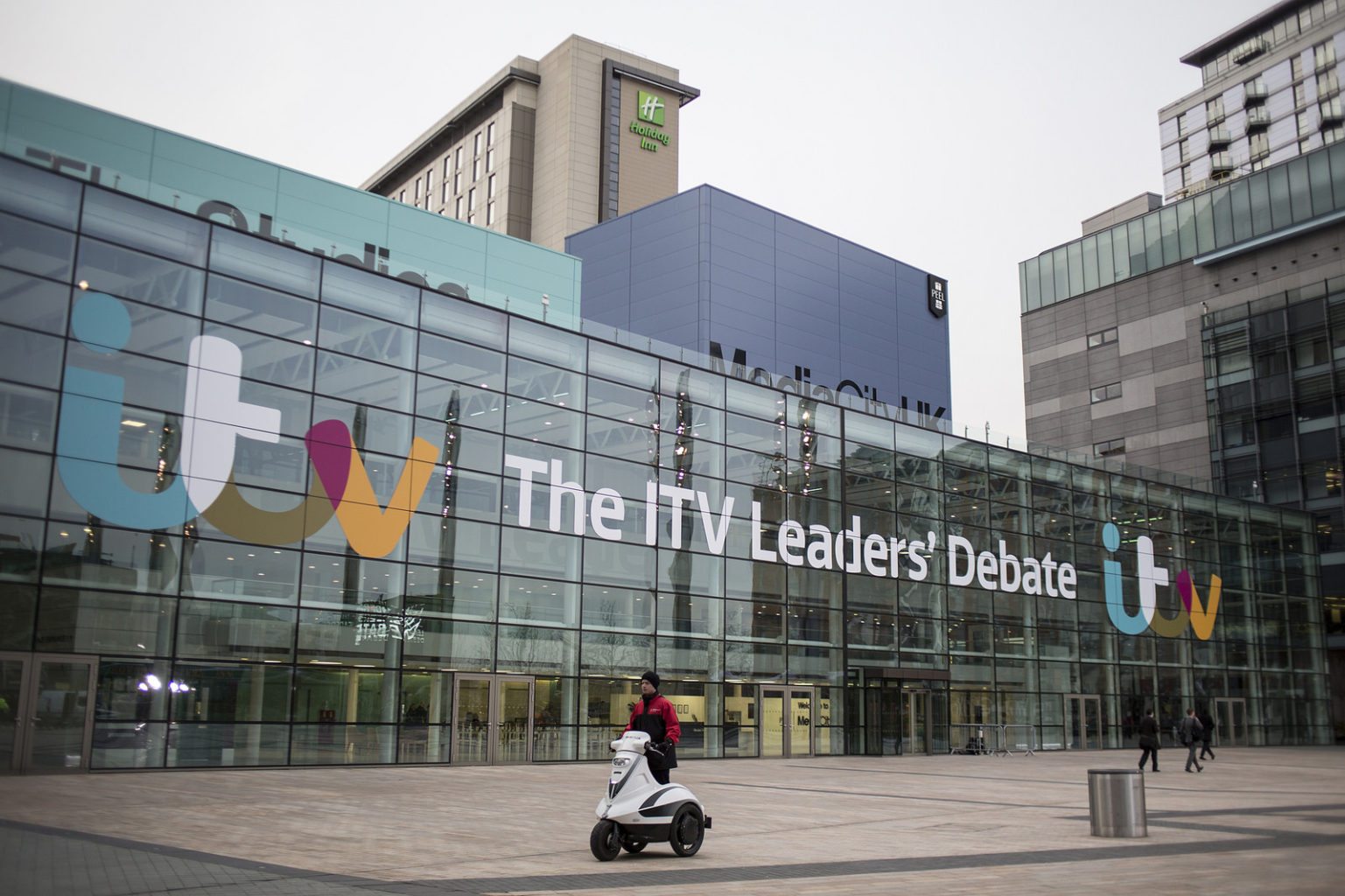
Comments